Five key stages of the 2024 Tour de France
The stages to watch next July, from the high mountains to the gravel roads and a potentially thrilling final time trial
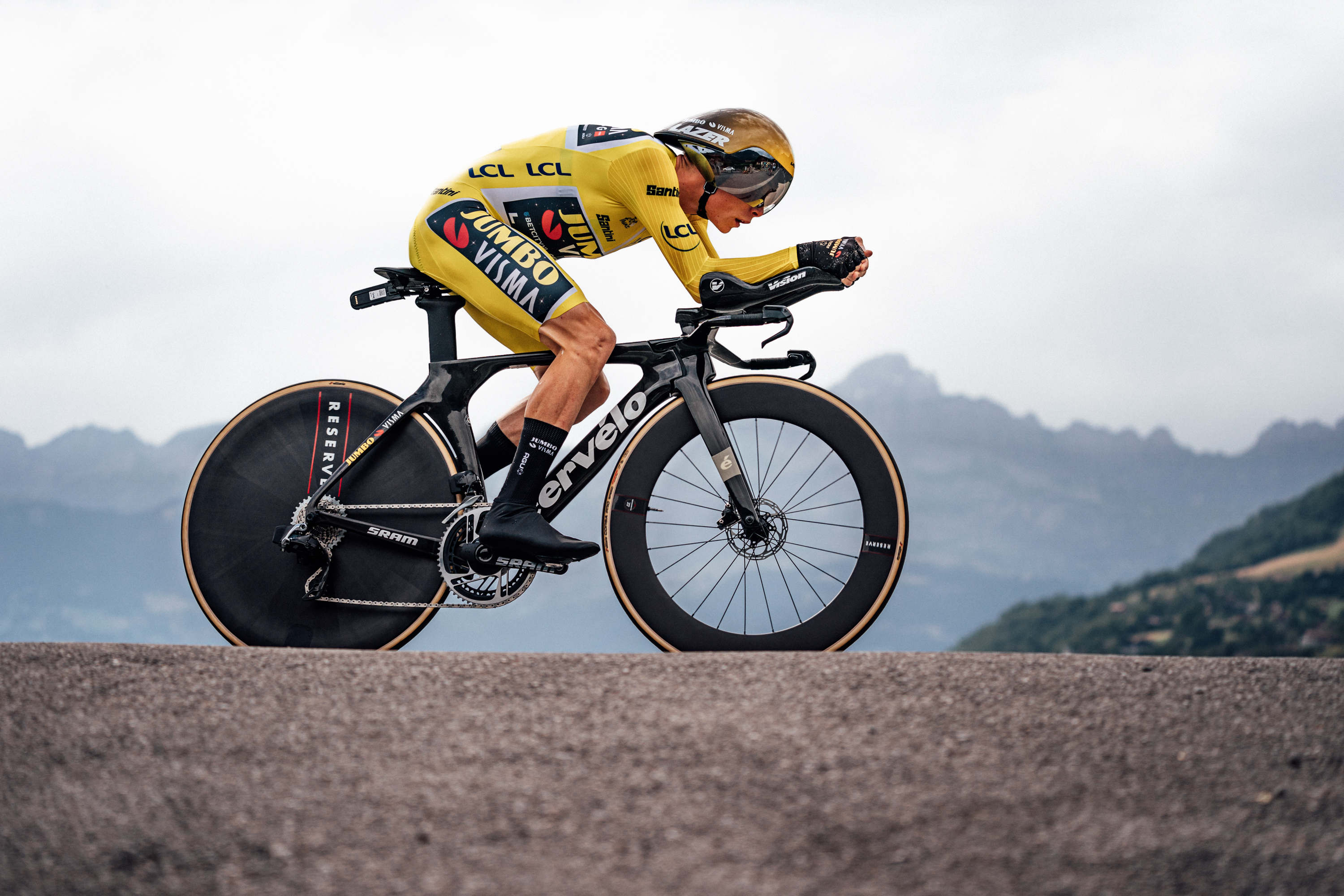
The 2024 Tour de France will feature an atypical but fascinating route. For the first time, the race will kick off in Italy and end in Nice rather than Paris.
The 25th foreign Grand Départ in the 120-year history of the Tour de France means that the race has started in every country bordering France aside from Andorra.
The 2024 Paris Olympics has also necessitated moving the final stage south to Nice, the first time the race has finished outside Paris and for an extra dramatic twist, the race concludes with a time trial for the first time in 35 years.
It'll be a Tour de France route far from the usual, then, although all the same ingredients that make the race what it is: high mountains, hills, time trials, and this year gravel – make up the 21 stages.
Full details of all the headline stages, barring the stage 7 time trial, have been unveiled and we've pored through the route to highlight five of the key stages of the 2024 Tour de France.
Stage 4: Pinerolo – Valloire, 138km
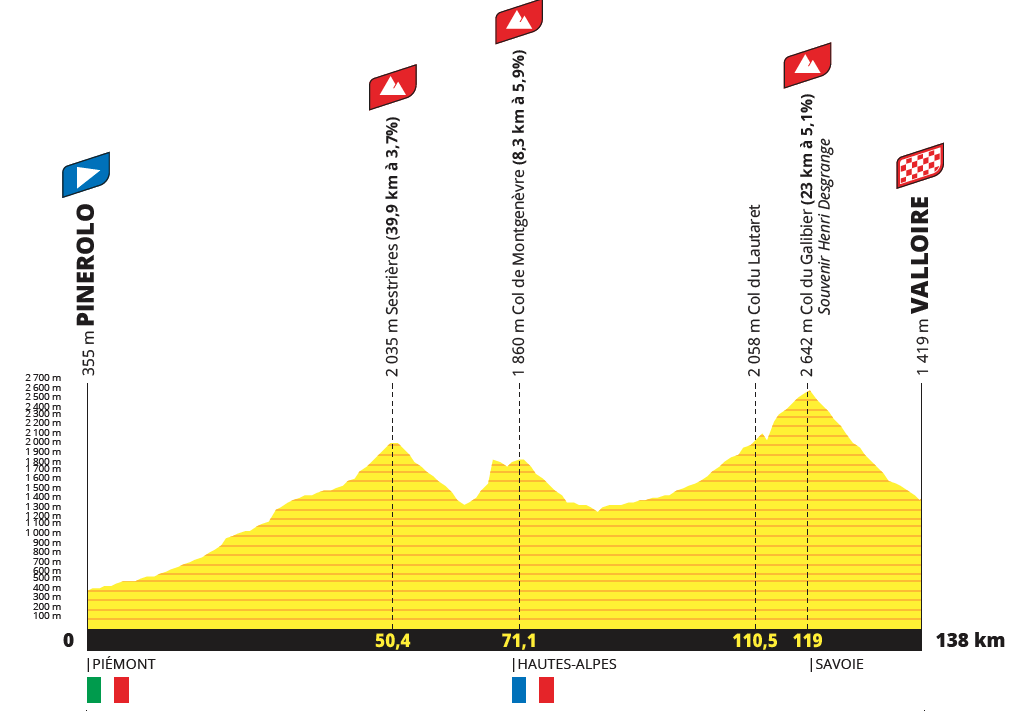
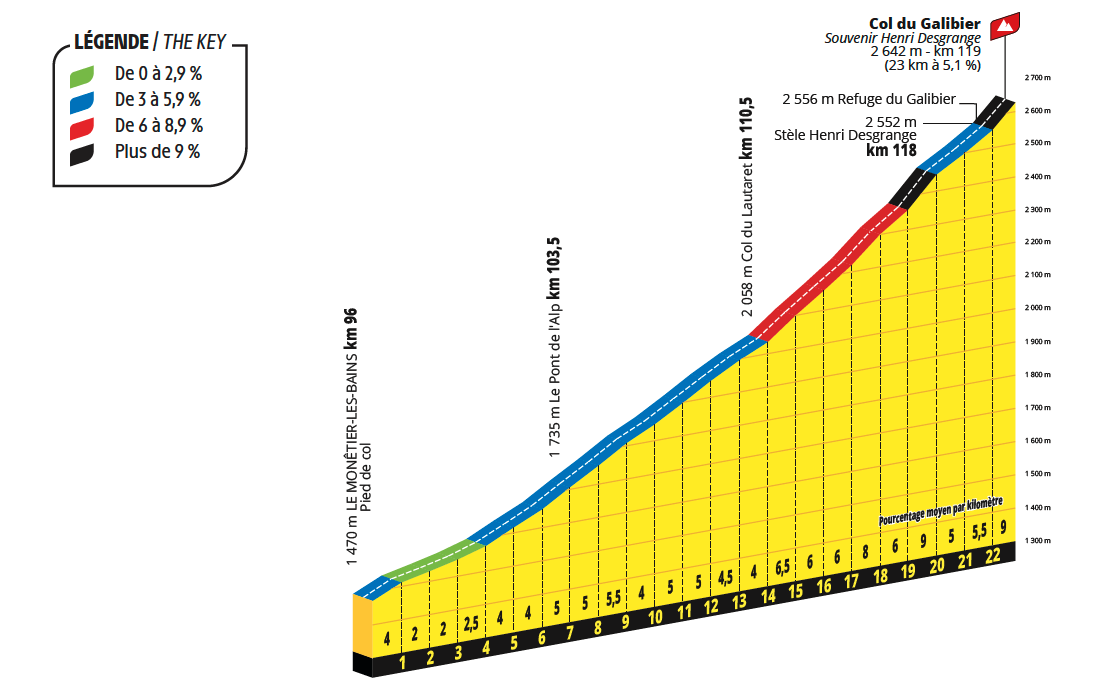
A Grand Départ in Tuscany, taking in several hilly stages en route to Turin and the French border mean a special treat for fans, as the race hits the high mountains just four days into the race.
Any riders who aren't quite in top shape at the start, or who have suffered with illness, form, or crashes in Italy, won't welcome the long drag to Sestriere (39.9km at 3.7%), the Col de Montgenèvre (8.3km at 5.9%) and of course the Col du Galibier (23km at 5.1%).
Get The Leadout Newsletter
The latest race content, interviews, features, reviews and expert buying guides, direct to your inbox!
The climbs aren't new to the Tour, of course, with Sestriere last featuring in 2011 and the Galibier featuring on back-to-back days two years ago – when Jumbo-Visma piled the pain on Tadej Pogačar before Tom Pidcock put on his stunning descending display.
Any yellow jersey earthquakes such as the Jonas Vingegaard display we saw on stage 11 in 2022 are unlikely at this early stage in the race, but with two climbs over 2,000 metres as early as stage 4 – the Galibier peaks at over 2,600 metres – there are bound to be some GC casualties.
At just 138km and with a descent to the finish in Valloire, the stage looks tailor-made for an audacious breakaway as the GC men battle behind.
We've already seen Ineos Grenadiers' Tom Pidcock show what he can do on the way down the Galibier – could he repeat the feat in 2024?
It might be tough to get the leeway to do the same next July but we'll no doubt witness some stunning feats of descending once again on the flowing and picturesque road down the famous climb.
Names including Fausto Coppi, Eddy Merckx, Luis Ocaña, and Marco Pantani have all led the Tour over the Galibier in the past. It'll be another special name which does the same on July 19 next year.
Stage 9: Troyes - Troyes, 199km
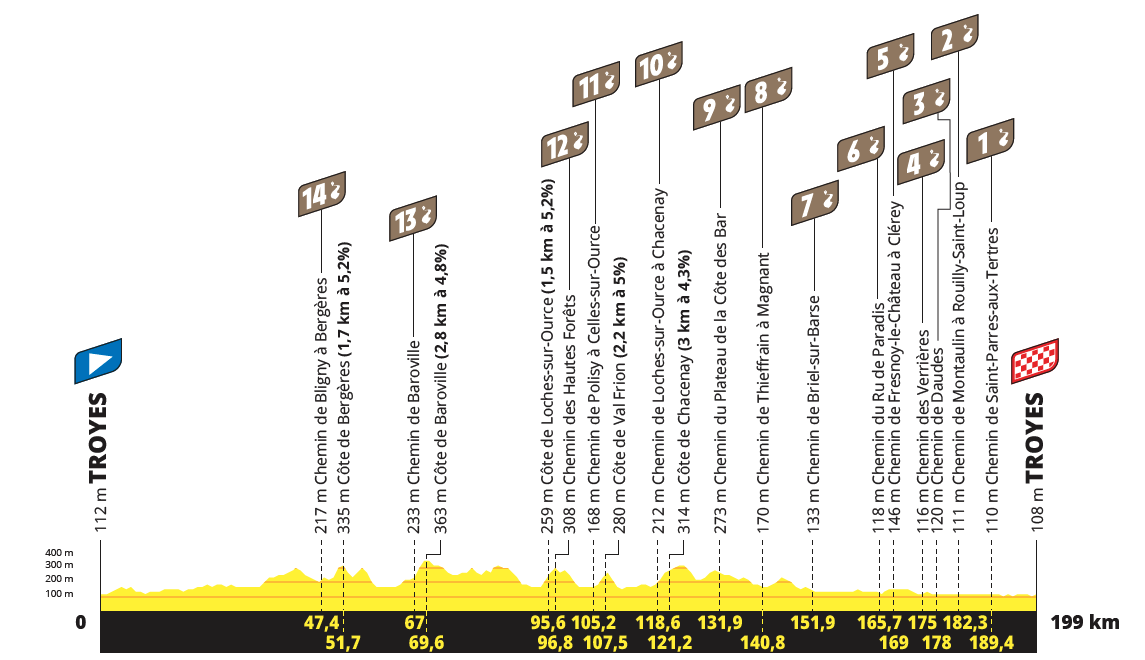
With the Tour taking the long way around France to the Pyrenees, the race enters something of a lull after crossing the border into France via the Galibier. Sprint and transitional stages, as well as the 25km stage 7 time trial lead the way to the next major climbing day at Le Lioran on stage 10.
However, Tour organisers have disrupted the race narrative up by throwing a big chunk of gravel into the mix, with stage 9 hosting 32.2km of the rough stuff spread over 14 sectors around Troyes.
Remco Evenepoel and team managers including Jumbo-Visma's Richard Plugge and Soudal-QuickStep's Patrick Lefevere have questioned the inclusion of gravel on the Tour route. However, there's no doubt that the stage will be a spectacle to behold, even if luck is set to play a part on the day.
"We had to come up with something clever," Tour route planner Thierry Gouvenou recently said of the routing across the mountain-free mid-section of the country.
That has resulted in the mix of hills – 2,000 metres of elevation – and white gravel tracks reminiscent of Strade Bianche that make up stage 9.
Those roads around Troyes featured in the Tour de France Femmes two years ago, with just 12.9km of gravel bringing high drama and chaos to the peloton.
With almost three times as much awaiting the riders in the men's race next summer, there's bound to be more of the same, even if debates about luck, fairness, and safety are bound to rear their heads.
Notable recent Grand Tour dalliances with gravel roads have included the legendary slugfest to Montalcino at the 2010 Giro d'Italia, the 2021 Giro's stage 6, won by the late Gino Mäder, and the gravel peak at the Montèe de Plateau des Glières at the 2020 Tour.
Those stages, as well as races including Strade Bianche and Paris-Tours, suggest that stage 9 of the 2024 Tour will be one of the highlights of the race.
Stage 14: Pau – Saint-Lary-Soulan Pla d'Adet, 152km
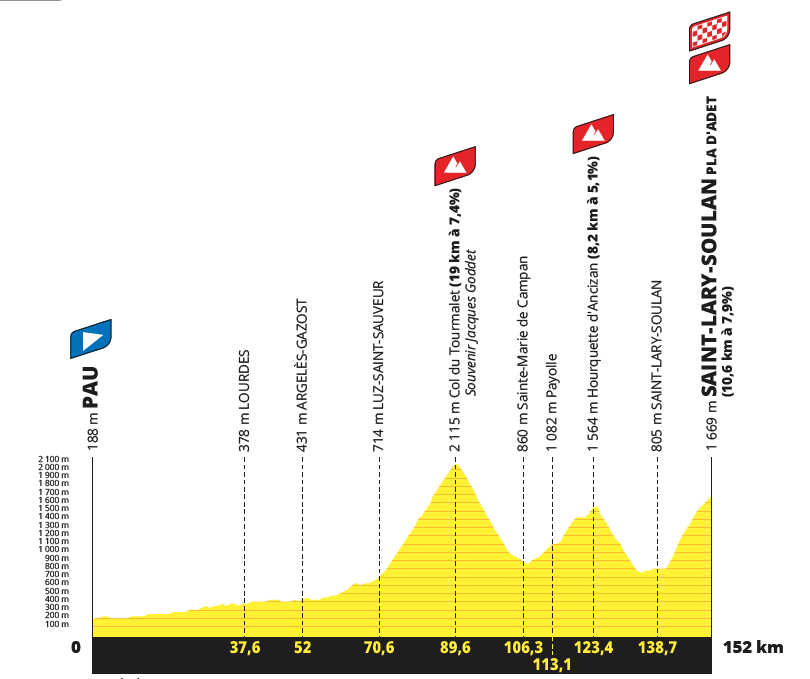
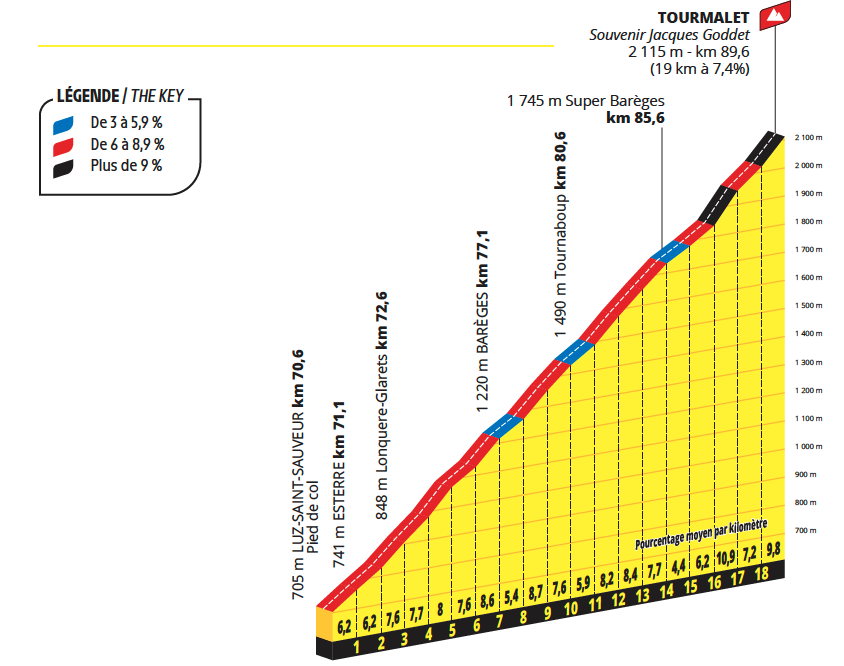
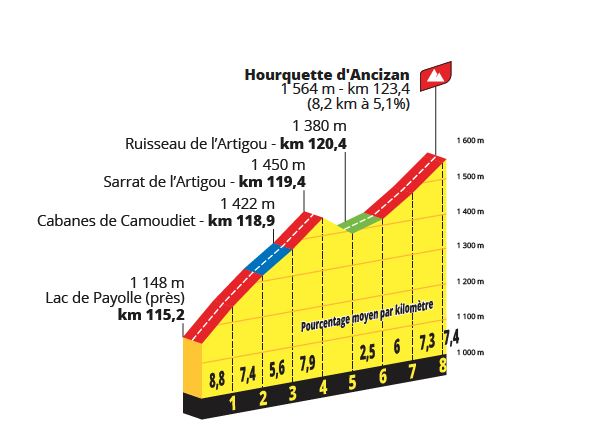
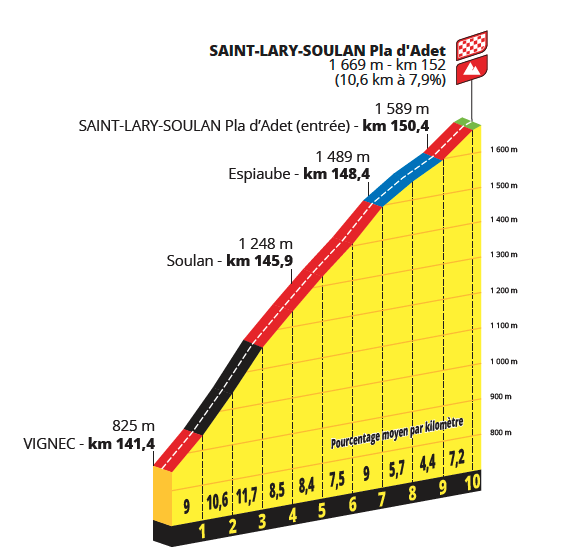
After early appointments at the Galibier and the mid-mountains at Le Lioran in the Massif Central on stage 10, the 14th stage of the race brings the first major summit finish of the race as the peloton hit the Pyrenees.
The finish at Pla d'Adet is the first of four summit finishes of the race, with two apiece featuring in the southern mountain range and the Alps in the east.
At 152km, stage 14 is the shorter of the two Pyrenean days by 47km, and it also features fewer climbs. However, the day brings three climbs back-to-back-to-back with little let-up in contrast to the long spells on the valley roads during stage 15.
For that reason, we've marked it as the one to watch in the Pyrenees, with the triple header of the Col du Tourmalet (19km at 7.4%), the Hourquette d'Ancizan (8.2km at 5.1%), and the finisher at Pla d'Adet (10.6km at 7.9%) sure to host a major GC showdown.
The Tourmalet is a well-known quantity at this point, featuring as it does for the fourth time in six years and the 84th time in Tour history. It should serve as a perfect stage to weaken tired legs or even for a certain team to push the pace if a rival falls behind early.
The path up the Hourquette d'Ancizan is one less well-trodden. The climb is on the route for only the sixth time, having made its debut in 2011. Once again, it's unlikely to host the decisive moment in the stage, more laying the groundwork for the final climb.
When the riders get to Pla d'Adet, they'll see the hardest test of the day up ahead of them with double-digit gradients welcoming them in the early stages of the climb to the line and uneven gradients ranging between 7% and 9% the rest of the way, barring a 2km spell at around 5% towards the top.
With plenty of hard stages left on the docket, the 2024 Tour might not be won on Pla d'Adet, but it can certainly be lost on this stage.
Stage 19: Embrun – Isola 2000, 145km
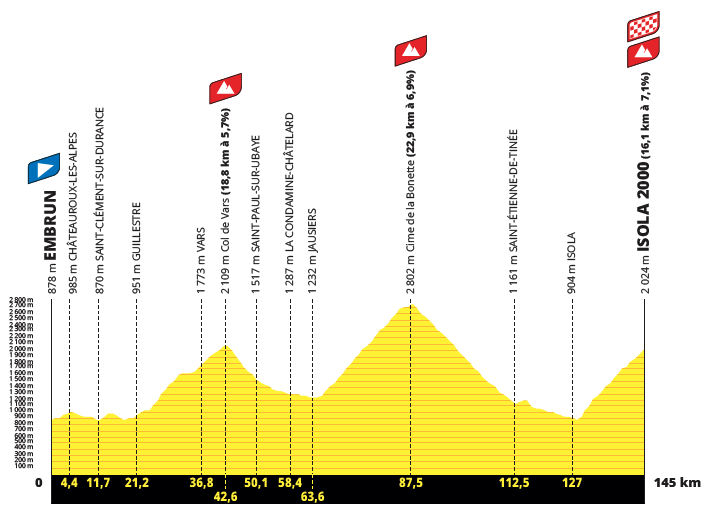
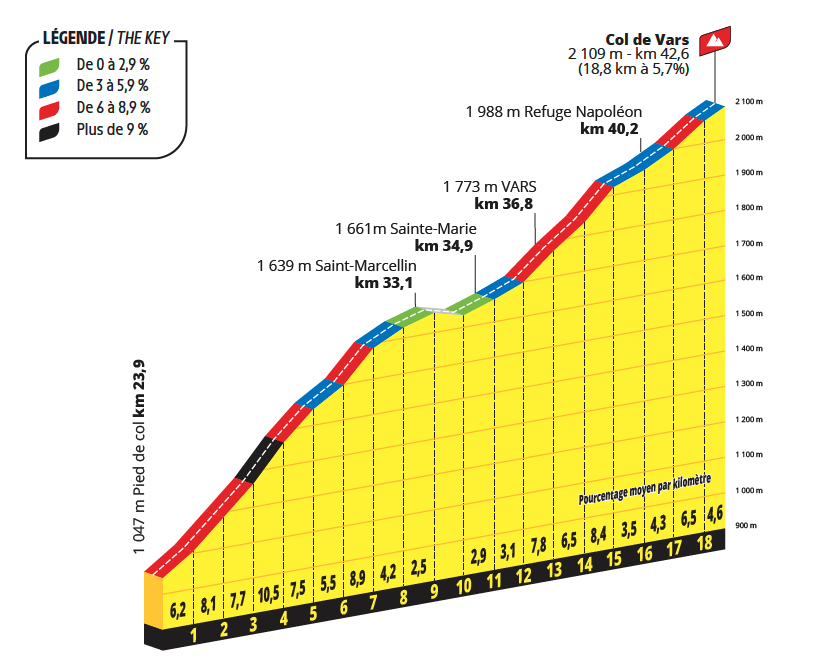
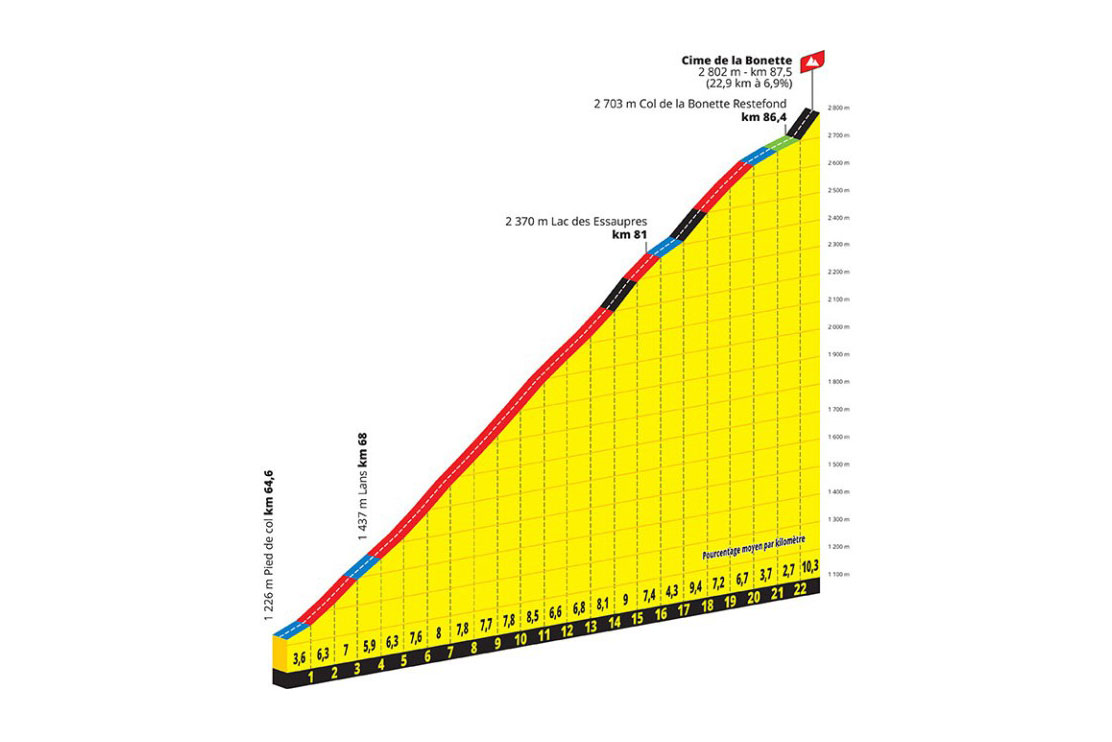
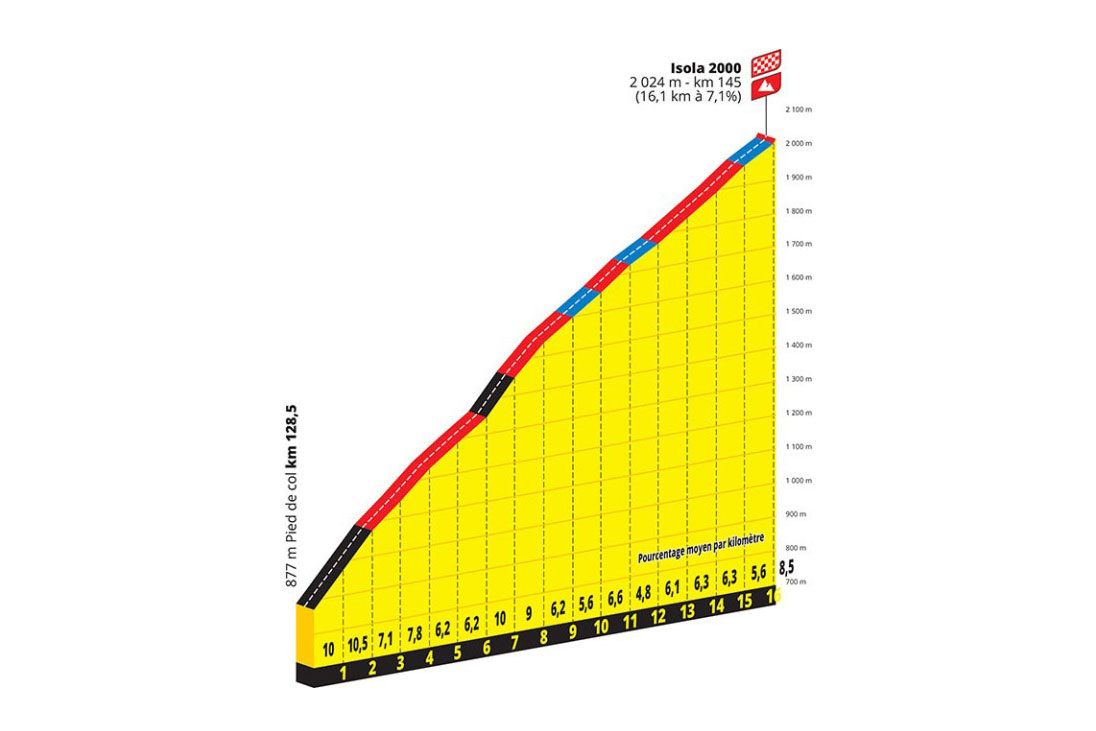
A backloaded Tour de France route means that there's a lot to look forward to in the last week.
A testing mountainous stage 17 to Superdévoluy gives way to a day in the hills on the road to Barcelonnette and then the final two big mountain tests – Isola 2000 on stage 19 and then the four-mountain 133km stage to the Col de la Couillole on the penultimate day.
We've gone with stage 19, the final day in the high mountains, as our pick for the fourth key stage of the 2024 Tour.
It might have fewer climbs (three vs four) and less climbing (4,500 metres vs 4,700) by comparison with stage 20, but three ascents above the 2,000-metre mark bring with them a huge chance to upend the general classification.
The high point of the Tour, the 2,802-metre Cime de la Bonette (22.9km at 6.9%) is back on the race for the first time since John-Lee Augustyn led the race over the top before crashing on the descent back in 2008. Previous riders to lead over the summit include Philippa York and Federico Bahamontes.
The Col du Vars (18.8km at 5.7%) leads into that monstrous climb, with a very long descent then leading into the final climb of the day to the finish at the ski resort of Isola 2000.
The 16.1km climb measures in at an average of 7.1%, with the hardest sections coming early and in the middle before gradients of 5-6% in the second half as the altitude will no doubt take its toll.
Once again, the climb is a lesser used one at the Tour, last featured on the route in 2008 and 1993, the latter hosting a finish as Tony Rominger beat Miguel Indurain to the line for the second of his three stage wins that year.
Back then, the Spaniard was in yellow and on the way to his third Tour win with a comfortable margin of over three minutes to second-placed Alvaro Mejia.
Let's hope that the GC isn't as settled when the riders hit Isola 2000 next July.
Stage 21: Monaco – Nice, 34km
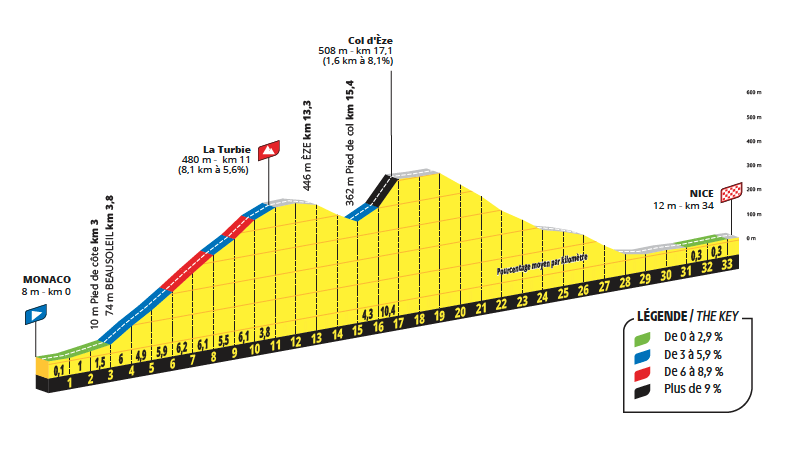
An atypical Tour de France concludes in an atypical way. Does anyone remember the last time the Tour concluded with a time trial?
The 1989 battle between Greg Lemond and Laurent Fignon is surely by now seared into the mind of any Tour de France fan, and next year race organisers have taken the brave step of attempting to recapture that magic with the first stage 21 time trial since.
Everyone watching the Tour next July will be keeping their fingers crossed for something approaching the same level of drama in Nice on July 21. Will the top favourites of Jonas Vingegaard, Tadej Pogačar, Remco Evenepoel, and Primož Roglič be within striking distance of each other after 20 days of racing?
If they are then they'll have over 700 metres of climbing packed into this 34km run from Monaco to Nice to contend with.
A short flat run to get things underway soon gives way to the 8.1km, 5.6% climb to La Turbie, before a short descent and a short but sharp ascent to the Col d'Eze (1.6km at 8.1%). With 10km of climbing coming in the opening 17km of the TT, all eyes will be on equipment selection and possible bike changes.
The closing half of the race is a speedster's dream, with 7km of flat roads mixed in with a 9km descent down the Col d'Eze. From the climbing to the descents, the potential for high drama runs all the way through this finishing stage.
Perhaps for the first time since that epic day in 1989, the closing stage of the Tour de France is a must-watch stage, and for that reason, it's our final key stage of the 2024 Tour.
Dani Ostanek is Senior News Writer at Cyclingnews, having joined in 2017 as a freelance contributor and later being hired full-time. Before joining the team, she had written for numerous major publications in the cycling world, including CyclingWeekly and Rouleur. She writes and edits at Cyclingnews as well as running newsletter, social media, and how to watch campaigns.
Dani has reported from the world's top races, including the Tour de France, Road World Championships, and the spring Classics. She has interviewed many of the sport's biggest stars, including Mathieu van der Poel, Demi Vollering, and Remco Evenepoel, and her favourite races are the Giro d'Italia, Strade Bianche and Paris-Roubaix.
Season highlights from 2024 include reporting from Paris-Roubaix – 'Unless I'm in an ambulance, I'm finishing this race' – Cyrus Monk, the last man home at Paris-Roubaix – and the Tour de France – 'Disbelief', gratitude, and family – Mark Cavendish celebrates a record-breaking Tour de France sprint win.